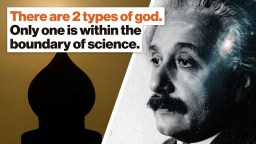MICHELLE THALLER: Chris, you ask the question about how religion affects our view of the cosmos. And the first thing I think about is simply the history of being human. There were so many things about the universe that we didn't understand. Thousands of years ago, we watched the seasons change or we observed things like thunderstorms and we had no idea, we didn't have the scientific knowledge to explain these things. And so it seems like a very natural, understandable, human instinct to try to ascribe these things to Gods, to beings that are so much more powerful than us we can barely comprehend them. And that sort of way of interpreting nature as spirits and things that are much more powerful than us I find very beautiful. Then, of course, what happens is you learn, you learn what causes lightning. The ancient Scandinavians might have said it was the god Thor actually causing lightning. Well we know it's not Thor – it actually has to do with friction inside clouds and generating electric charges. We understand now why the Sun shines and why the seasons change.
And there seems to be this instinct to always put God farther and farther away. So now that we understand thunderstorms maybe God lives in the sky; we just put the idea of God farther away from what we know. People say, okay, well now we understand how planets work and how galaxies work, but maybe God set off the Big Bang. Why are we always pushing God away? Why are we always making the concept of whatever God is farther and farther and farther and as soon as we have scientific knowledge about something we say, "Okay, well, that's not God. God must be farther out still." There's never been a time in human history where we realized that some things had scientific explanations and some things didn't. It's like, 'Okay we know why the Sun shines, we know why the seasons change, but lightning? That really is Thor.' That actually never happens. Everything that we explore we actually add to our body of knowledge.
And while I am not personally religious, it seems to me to be a disservice to the idea of God that God constantly gets farther and farther away. You put him, or however you want to call it, just outside the grasp of human knowledge. Someday we will understand what set off the Big Bang and I don't think the answer is going to be God. Maybe God is something more personal to you. Maybe it's how you relate to other people, maybe it's how you define your morality, maybe it's something that's very, very important in our culture.
But I also think that we do the universe a disservice because we're putting our own ego, our own vision of ourselves out there. There are many religions that seem to think of God as something like a person, some very, very powerful version of a human being. And there are other religions that don't that talk about natural forces or gods that are incomprehensible. But all of them seem to be too much about putting our own selves, our own fears, our own version of what morality should be, out onto the universe and the universe really doesn't care about any of that. I sort of wish we observed the universe the way it is and then turn it back on ourselves. We are a reflection of the physical laws around us.
People often say, "Why is the universe so perfectly tuned that human life can exist at all? Why do we have the right temperature planet around the most perfect type of star you can have? Why are all the physical laws exactly what you need for matter to hold together?" And this, to me, always seemed like putting the cart before the horse. We are a product of the laws of the universe. The reason we have evolved to be this type of biology is because we evolved on this planet. There may be creatures that evolve on very different planets that are asking the same question: "Why are we on the perfect planet for life?" — but they're a methane-based fish somewhere on Titan. I mean, who knows. You have to really understand that the universe has nothing to do with our vision, but our minds, our sense of beauty, our sense of mathematics and how things fit together, they do work really well with the physical laws of the universe, but that's not a coincidence. They evolved inside the universe. Our minds came to consciousness with these physical laws and these conditions.
So I think we actually can learn more about the larger universe by studying ourselves better. Why is it that we enjoy the golden ratio in mathematics? How do our minds really reflect what the physical constants and the laws of nature are? I find that wonderfully rich and it helps me fit into the larger context of the universe, which I think is the most noble goal of any religion.






